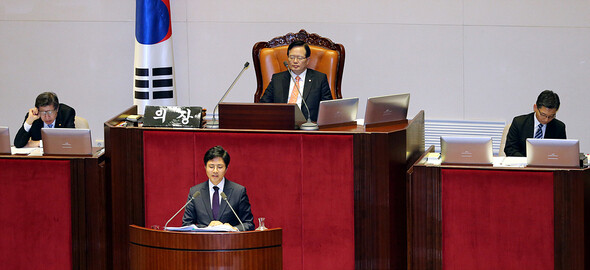hankyoreh
Links to other country sites 다른 나라 사이트 링크
[Editorial] Anti-terror bill would just give the NIS more power it doesn’t deserve

The anti-terror bill that would give the National Intelligence Service (NIS) far greater authority was presented before the regular session of the National Assembly on Feb. 23 on the authority of Speaker Chung Ui-hwa. This is the end result of Chung and the ruling Saenuri Party (NFP) brushing off opposition objections and skipping procedure to address what they are calling a “security emergency.” While there are real questions about the effectiveness of our terror prevention methods, this legislation creates even greater potential for the NIS to meddle in politics and threaten democracy and human rights. The terror threat is being used as excuse to make a powerful behemoth out of an agency that should rightly be targeted for reforms.
It is clear as day that this law would do nothing but increase the NIS’s authority and scope. Having seen its very existence called into question by advancements in democracy, the agency has long used the terror threat as a way of holding on to power. In the case of this legislation, the pretext is the North Korean terrorism threat in the wake of the nuclear test last month. But there hasn‘t been any concrete evidence that North Korea actually is planning any terrorist measures, apart from intelligence leaked by the NIS itself. The current system and laws should also be adequate to respond to the possibility of terrorism. Besides that, the current situation does not meet the conditions for the Speaker to invoke his right to put the bill up for a vote - this is hardly a case of “wartime, disaster, or an equivalent national emergency.” Yet the Blue House and ruling party have engaged in deception and scare tactics, acting as though a national emergency might happen at any moment if we don’t immediately hand the NIS indiscriminate authority to collect intelligence, tap wires, or conduct investigations. This is a case of going above the law and disregarding the principle of bipartisan consensus, and we can‘t help asking just what the aims are.
The terms of the legislation are even more worrying. They’re said to reflect past negotiations between the ruling and opposition parties, but that‘s just pretense. The risk is still present. A terrorism prevention organization that was originally set to be part of the NIS was also reportedly made into a committee under the Prime Minister, but that committee’s studies are confined to planning and coordination. Real authority - for things like collecting confidential communications, tracking bank accounts, requesting stops on financial transactions, and gathering intelligence on movements in and out of the country - is in the NIS‘s hands. The agency would also gain powers that could easily be abused for other aims, including the right to request emergency deletions of online posts and impose exit bans on South Koreans and foreign nationals viewed as posing a terrorism risk.
For all the new powers the NIS would enjoy, the current mechanisms for monitoring and controlling it remain feeble. A human rights protection officer position is reportedly being created to monitoring the NIS for possible evasions of the law, but it remains very much in question just how great a role he or she will have. The NIS’s history to date shows just how prone an organization can be to contamination and deviant behavior when the checks against it aren’t tailored to the trappings of power. This decision to rush through the terror prevention will come back to haunt us as the moment when democracy was truly destroyed.
Please direct questions or comments to [english@hani.co.kr]

Editorial・opinion
![[Guest essay] The real reason Korea’s new right wants to dub Rhee a founding father [Guest essay] The real reason Korea’s new right wants to dub Rhee a founding father](https://flexible.img.hani.co.kr/flexible/normal/500/300/imgdb/original/2024/0423/8317138574257878.jpg) [Guest essay] The real reason Korea’s new right wants to dub Rhee a founding father
[Guest essay] The real reason Korea’s new right wants to dub Rhee a founding father![[Column] ‘Choson’: Is it time we start referring to N. Korea in its own terms? [Column] ‘Choson’: Is it time we start referring to N. Korea in its own terms?](https://flexible.img.hani.co.kr/flexible/normal/500/300/imgdb/original/2024/0423/3617138579390322.jpg) [Column] ‘Choson’: Is it time we start referring to N. Korea in its own terms?
[Column] ‘Choson’: Is it time we start referring to N. Korea in its own terms?- [Editorial] Japan’s rewriting of history with Korea has gone too far
- [Column] The president’s questionable capacity for dialogue
- [Column] Are chaebol firms just pizza pies for families to divvy up as they please?
- [Column] Has Korea, too, crossed the Rubicon on China?
- [Correspondent’s column] In Japan’s alliance with US, echoes of its past alliances with UK
- [Editorial] Does Yoon think the Korean public is wrong?
- [Editorial] As it bolsters its alliance with US, Japan must be accountable for past
- [Guest essay] Amending the Constitution is Yoon’s key to leaving office in public’s good graces
Most viewed articles
- 1Samsung barricades office as unionized workers strike for better conditions
- 2[Editorial] Japan’s rewriting of history with Korea has gone too far
- 3[Column] The clock is ticking for Korea’s first lady
- 4[Column] The president’s questionable capacity for dialogue
- 5[Reporter’s notebook] Did playing favorites with US, Japan fail to earn Yoon a G7 summit invite?
- 6Korean government’s compromise plan for medical reform swiftly rejected by doctors
- 7Why Korea shouldn’t welcome Japan’s newly beefed up defense cooperation with US
- 8Senior doctors cut hours, prepare to resign as government refuses to scrap medical reform plan
- 9[Column] ‘Choson’: Is it time we start referring to N. Korea in its own terms?
- 10[Guest essay] The real reason Korea’s new right wants to dub Rhee a founding father